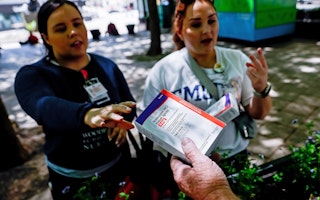Moving the Needle on Drug Policy in Asia
By Takayuki Harada
Bad drug policies can drive health crises and damage individuals and communities. They can also become the regional norm as countries copy their neighbors.
Asia boasts some of the harshest laws in the world, including the death penalty for drugs and caning of drug users. These laws steer people away from lifesaving health services and fill prisons with people in need of treatment.
However, there are regional pioneers that are charting new courses on drug policy. With the support of the Open Society Foundations, researchers from Mejiro University went on a fact-finding mission to learn about alternative approaches in the region and beyond.
In Taiwan, we encountered a burgeoning harm reduction movement that is successfully stemming a startling increase in HIV. For example, there were typically a few hundred new HIV infections per year, but in 2004, the number increased to 1,520. The following year, 3,380 new infections were detected, most from injecting drug users.
In response, the Centers for Disease Control in Taiwan introduced harm reduction services that prioritized prevention of HIV, including needle exchanges and methadone maintenance therapy. Currently, about 20,000 syringe and needle kits are distributed every month in Taiwan. Since used syringes and needles are exchanged with new ones, 90 percent of the distributed syringes and needles have been collected.
Availability is key. People must have easy access to lifesaving equipment. To that end, there are also 500 needle and syringe vending machines near parks, pharmacies, and hospitals throughout Taiwan. In addition, drug users can receive methadone treatment at 102 hospitals in Taiwan for about 20 Taiwan dollars per treatment (or about 67 cents in USD).
This helped reduce new HIV infections to below 2,000 in 2006, a dramatic reduction over a short period of time.
We hope that the creation of these types of health services can drive a greater social movement toward offering support, not punishment, to people who use drugs.
That appears to be an emerging trend in Malaysia, which has established centers that provide inpatient and outpatient services to people who use drugs. These facilities, known as “Cure & Care,” offer various voluntary services such as substitution treatment and peer counseling. We visited one facility to meet the staff, speak to patients, and learn more about the challenges they face.
In both Malaysia and Taiwan, people who use drugs continue to suffer fear and stigma. Criminal justice policies are a disruptive presence in drug users’ lives, and there is often public resistance to services.
In addition, governments that attempt to introduce services are likely to experience some bureaucratic tension. For example, as public health services take a greater role in policymaking, there is a chance that criminal justice authorities fight to retain supremacy. In addition, there may be a public backlash against services, which happened in Taiwan until people saw that they were successful.
These challenges are not insurmountable. However, navigating them requires patience as well as a robust effort to educate the necessary personnel. In numerous jurisdictions, law enforcement authorities and the public have come to support better services for people who use drugs.
Hopefully, these pioneering services can set an instructive example for the region to follow.
Takayuki Harada is an associate professor at Mejiro University in Tokyo, Japan.


